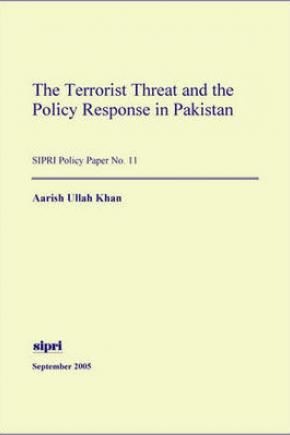The Terrorist Threat and the Policy Response in Pakistan
Over and above the frightening levels of terrorist violence that persist in Iraq, a major terrorist incident in London and threats against other European countries have kept the terrorist menace high on the international agenda in 2005. Few nations have had a more intimate and troubled relationship with this scourge than Pakistan: a one-time supporter of the Taliban that has at the very least condoned terrorist infiltration in Kashmir, but that now aligns itself firmly with the international 'war on terrorism' and whose own president has been the target of extremist assassins. The suggestions that perpetrators of the July 2005 London bombings might have found succour in extremist circles in Pakistan, at the same time that Pakistani forces have been going to unprecedented lengths to hunt down al-Qaeda, provides just one hint of the complexity of the resultant problems.
In this Policy Paper Aarish Ullah Khan sets out in concentrated and penetrating fashion the historical, political and strategic background to Pakistan's experiences with religiously motivated terrorism as both a tool and a curse. He shows that, while Pakistan's identity as a nation state is inseparable from Islam, no such easy equation can be made with religious extremism or with the related brands of terrorism. Rather, certain Pakistani leaderships (and power constituencies, like the army) have chosen to instrumentalize religious fervour and even terrorist violence for their political and strategic purposes at various times—not always against the wishes of Western powers. The consequences of such past choices have come home to roost for President Pervez Musharraf, who has set his face against all brands of terrorism but has, so far, found it much simpler to pursue al-Qaeda and to stamp down on purely domestic extremism than to extract the terrorist fuse from the powder keg of Kashmir. As Khan argues, only progress in peace with India in the short term, and attention to Pakistan's weaknesses of society, economy and governance in the longer term, can separate Islam and terrorism as they must be separated for the future stability and dignity of the state.
The IRS is a think tank that was set up in 1982 as a non-profit research centre to study the region in which Pakistan is located. The primary focus of the Institute is on politics, political economy, international relations, and socio-cultural and security issues.
During his association with the Institute of Regional Studies, Aarish Ullah Khan has published a research paper entitled 'A decade of Indian economic reforms and the inflow of foreign investment' in Regional Studies (vol. 21, no. 2, spring 2003) and conducted a variety of other studies. He has also written a number of articles for Pakistani newspapers. The primary focus of his current work is on Afghanistan, but he retains his keen interest in the politics of Pakistan and the issues of religious radicalism and militancy.
Previously, he worked for a short period in 2002 with the Repatriation Project of Afghan refugees from Pakistan under the supervision of the United Nations High Commissioner for Refugees and in 2004 with the NWFP Essential Institutional Reforms Operationalisation Program under the United Nations Development Fund.
1. Setting the scene: The historical, political and religious background
2. The terrorist threat
3. The countermeasures
4. Conclusions

